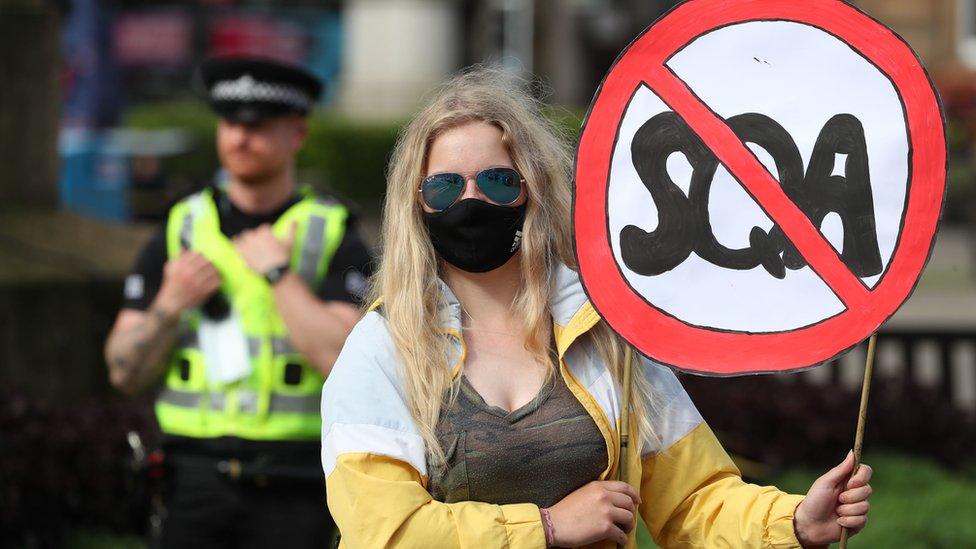Scottish exam results: What are the options for fixing the system?
- Published
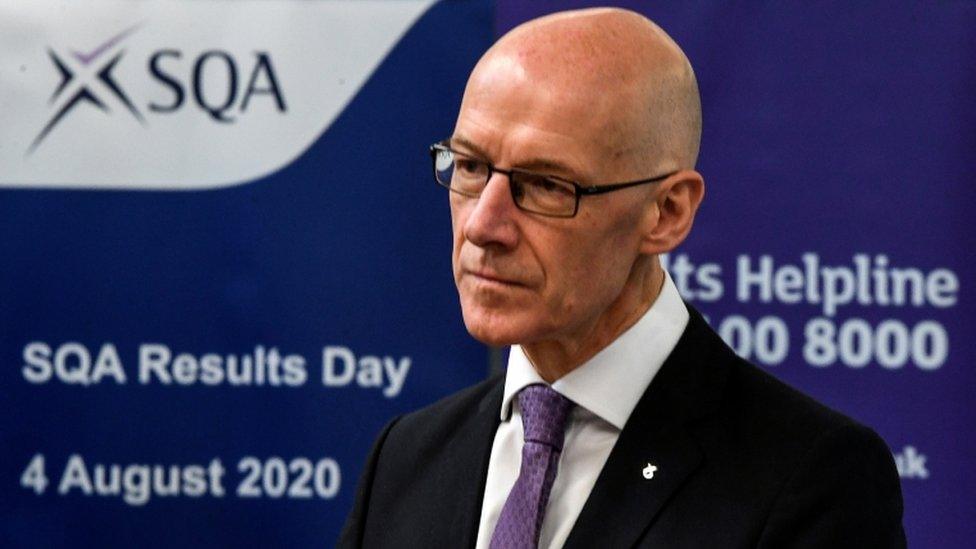
Education Secretary John Swinney will make a statement on Tuesday
First Minister Nicola Sturgeon has admitted her government "did not get it right" with the system used to produce grades for Scottish school pupils. Education Secretary John Swinney will announce his plans to tackle the problem on Tuesday - but what are his options, and will they save him from a no-confidence vote at Holyrood?
What happened this year?
With Scotland's exam diet cancelled for the first time in history due to the coronavirus pandemic, the Scottish Qualifications Authority scrambled to come up with a new system to calculate results.
The plan was for grades to be based on teachers' estimates for each of their individual pupils, based on everything they had done during the school year.
Teachers were also asked to rank their students, and the results were then fed through a national "moderation" system.
This system, which had been created to address fears that the results would not be "credible", ultimately saw about 125,000 of those grades lowered.
The estimates put forward by teachers turned out to be far higher than the pass rates for previous years, and the moderation system sought to bring them back closer in line with previous terms.
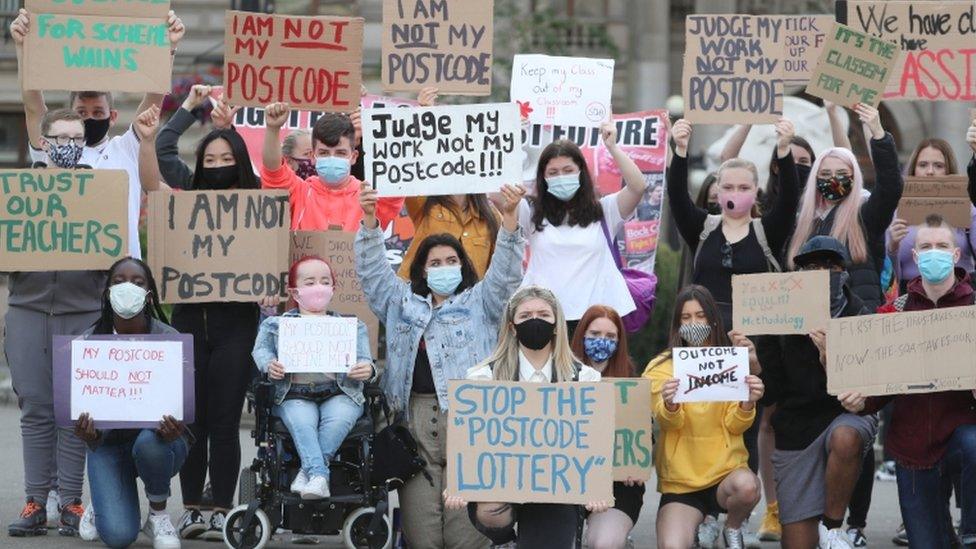
The lowered grades sparked an outcry from students - which was intensified by the belief that many were penalised due to how their school had performed in the past. The pass rate of pupils sitting Highers in the most deprived areas was reduced by double the rate of those from the most affluent backgrounds.
The government initially attempted to defend the system, but has now accepted that it "did not get it right" and will make changes.
The original plan may have been to tough it out and wait for the free appeals process, but that option has now fallen by the wayside.
Concerns had been growing about the volume of appeals which could be submitted, and how long they could take to process.
Schools have plenty on their plates trying to reopen safely in the middle of a pandemic without having to gather evidence for tens of thousands of appeals.
Ms Sturgeon has now said that they will not expect every student to appeal, and that "the onus will be on government to fix this".
This suggests a fairly radical departure from the current system is on the cards - but what could it be?
Use teacher grades?
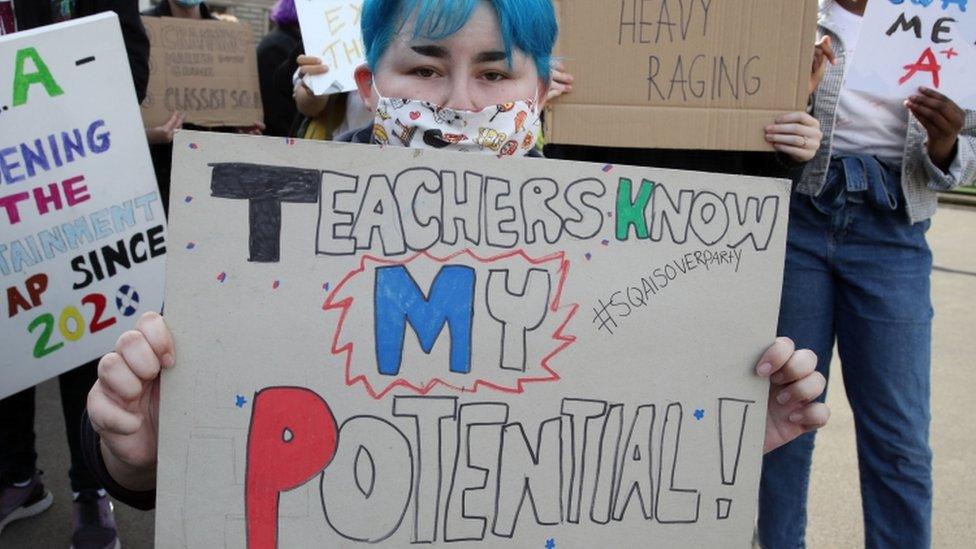
There have been calls to use the original teacher assessments of grades without SQA moderation
Scottish Labour, who are pushing for a vote of no confidence in the education secretary, say the grades originally drawn up by teachers should be used for pupils who were downgraded.
However, these grades, taken overall, would represent a significant improvement on previous years - including a jump of 20 percentage points in the pass rate for pupils from the most deprived areas.
Ms Sturgeon has previously said such a leap would not be "credible" and would "run the risk of undermining the integrity of the whole system".
However, the first minister conspicuously did not rule out such a move in her latest briefing. She said it would be a "bigger problem" for pupils to conclude that the system is stacked against them.
She has also pledged not to reduce the grades of any student who ended up with a better result than suggested by their teacher.
This is a tricky bind for the government. It doesn't want to disappoint pupils or their parents, and it doesn't want to throw teachers under the bus - even if some might have been somewhat optimistic in the grades they had predicted.
But ministers also won't want to make a rod for their own back in future years. If the pass rate for 2020 is exceptionally high, how can the class of 2021 hope to live up to it?
Use prelim scores?
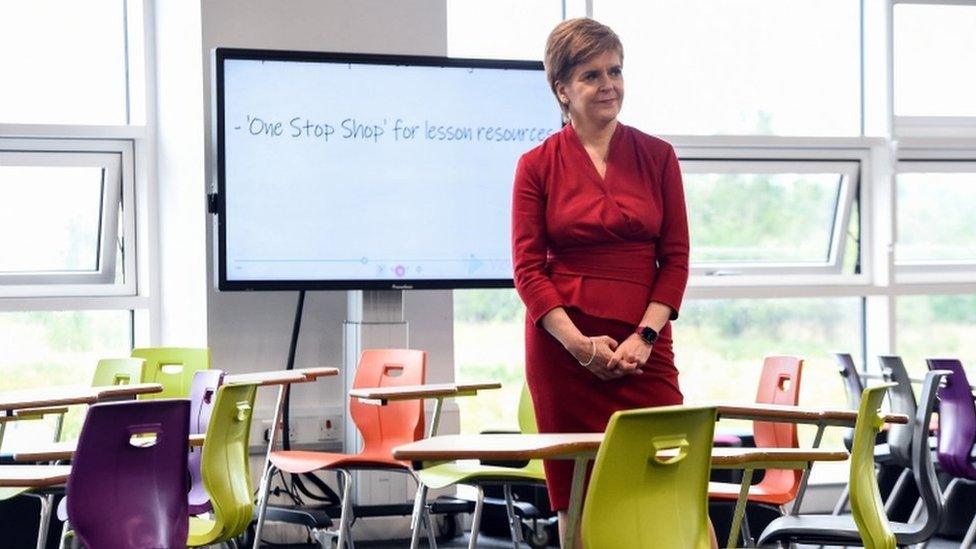
Nicola Sturgeon has suggested that pupils losing out would be a "bigger problem" than an extremely high pass rate
This idea, initially championed by the Scottish Greens and backed as an option by the Conservatives, would see the grades pupils achieved in their prelims (or mocks) as a "baseline".
This could be an attractive idea, as they are a readily available concrete example of how a pupil performs under exam conditions. It is also very easy to point to any disparity between the grades where pupils have been marked down by the system.
However, many will also contend that results can change radically in the months between the prelim and the final exam. What if a poor score in the practice exam was the kick in the behind a student needed to knuckle down for the real thing?
Treating them as a "baseline" would mean some pupils with exceptional coursework, or who had impressed their teacher in class, could still outperform a poor prelim result - but making individual adjustments on this level could prove just as labour-intensive as wading through thousands of appeals.
Let students sit exams?

The Scottish Tories have suggested letting students who are unhappy with their grades sit an exam, if they do not want to accept their prelim result or the final one.
Although presumably this would see a limited number of pupils sit exams, it would still face the same practical problem the original diet did - coronavirus.
In any case, Ms Sturgeon's statement that it is down to ministers to sort the results out, not students, suggests there is little chance of teenagers who thought their school days were over being herded back into an exam hall.
Redesign the whole system?
While a short-term fix will be needed to head off the immediate storm, Mr Swinney might also take a longer view about the exam system as a whole.
Ms Sturgeon has mused about what the best way of "assessing the performance of young people" might be. Is it the result of a one-off exam, or the assessment of a teacher who monitors the pupil across a whole year?
The government does love a working group, and it would be easy to imagine some educational bigwig being tasked with drawing up a detailed report for ministers to consider ahead of May's Holyrood election.
This could sit nicely alongside the OECD review of the senior phase of education, which is due to report back next summer.
The difficulty again would be the implementation - how could a major reform to how pupils are assessed be phased in while maintaining a level playing field in the qualifications of past and future pupils?
Will it save Mr Swinney?
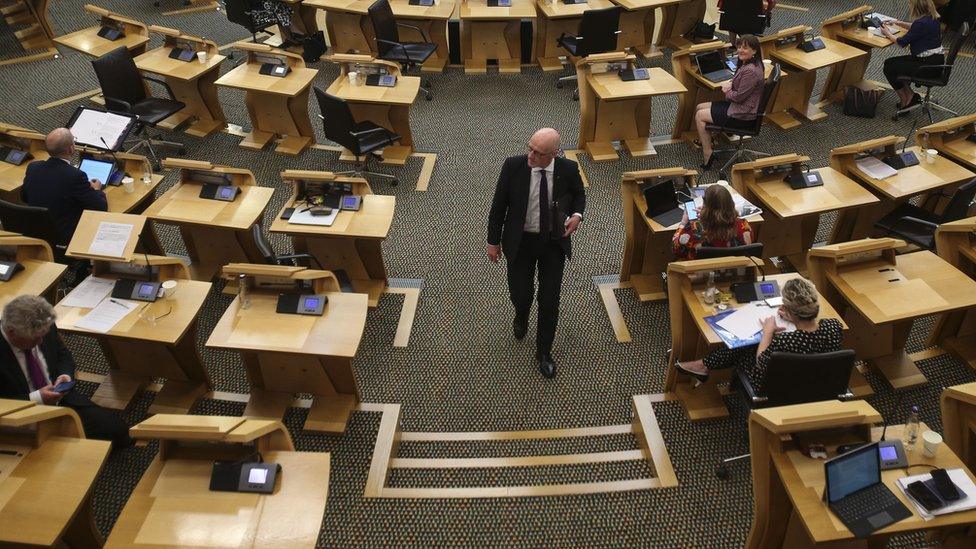
Will Mr Swinney face a vote of no confidence at Holyrood?
To start with, even losing a confidence vote at Holyrood technically would not doom the education secretary. Unlike the government as a whole, there is no statutory requirement for a minister to go after losing such a vote - although in reality the pressure on them would be immense.
Ms Sturgeon has absolved the SQA of any blame, making it very clear that the buck stops with ministers.
Having come up with the idea, Scottish Labour are likely to push for a vote against Mr Swinney regardless of what he comes up with. The same is probably true of the Scottish Conservatives.
So his fate will ultimately lie in the hands of the Greens and the Lib Dems, who are both waiting to hear the detail of the statement.
Ms Sturgeon insists this is "not party political", and that she would look to do right by students regardless of any looming rebellion at Holyrood.
However, it is inescapable that she is a first minister facing an election in May, and who pegged education and boosting pupils from more deprived backgrounds as her number one priority for the current term of parliament.
If her government is seen to have dropped the ball on that very issue, months before voters go to the polls, it could be a lot more than the fate of Mr Swinney on the line.
- Published10 August 2020

- Published7 August 2020
